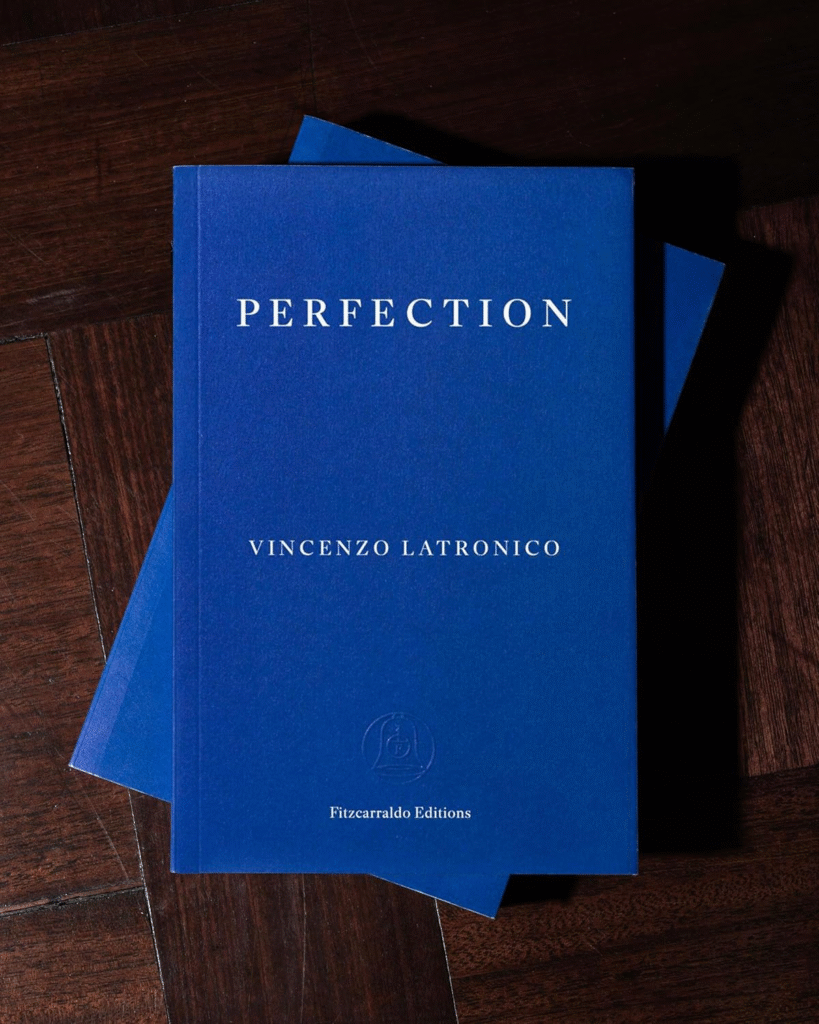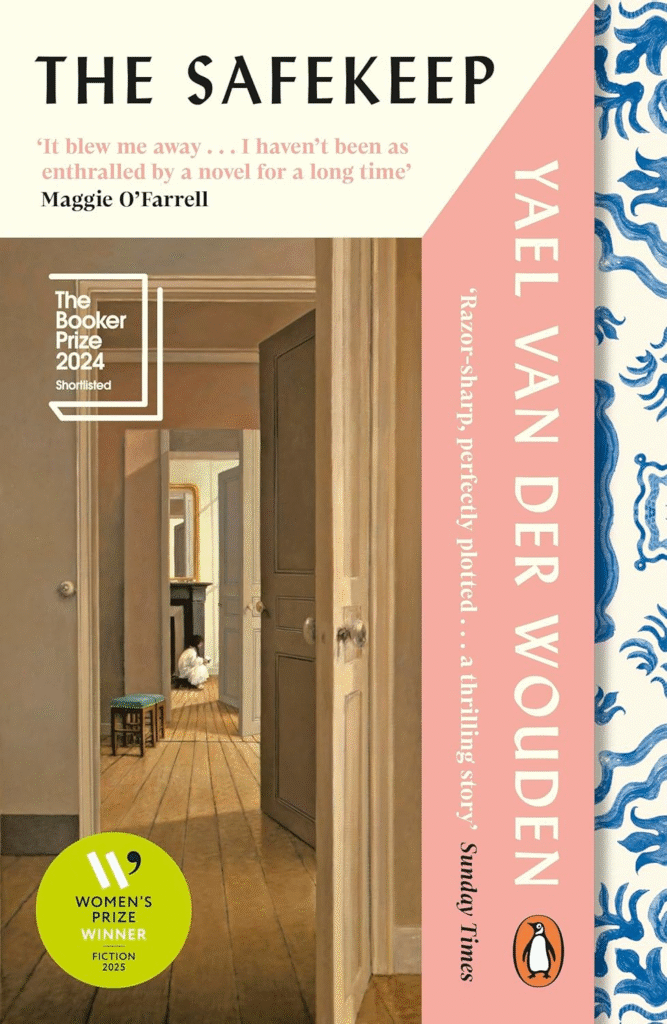Perfection by Vincenzo Latronico, translated into English by Sophie Hughes, was published on 13 February 2025 and has already gained recognition, being shortlisted for the International Booker Prize 2025. The novel follows Anna and Tom, a millennial couple living in Berlin, who appear to have the perfect life in a stylish apartment filled with plants, coffee rituals, and creative jobs. Their days are shaped by social media, parties, and cultural trends, but behind this curated image is a growing emptiness. Perfection shows how a generation that seems to “have it all” often struggles with meaning, purpose, and true happiness.

At its core, Perfection is not just the story of Anna and Tom, but also a portrait of millennial expat culture in cities like Berlin, Lisbon, and Sicily. Latronico reveals how social media influences daily choices, from furniture and food to travel destinations, and how the constant pursuit of an ideal lifestyle leaves the couple increasingly unsatisfied. Their progressive politics feel hollow, their work becomes repetitive, and even their attempts at activism fail to bring fulfilment. What begins as a celebration of freedom slowly turns into a realization that curated perfection cannot replace authenticity.
Perfection also pays homage to Georges Perec’s 1960s novel Les Choses, mirroring its structure and themes while adapting them for the digital era. Just like Perec’s characters, Anna and Tom remain somewhat distant and anonymous, representing a generation rather than individuals. Latronico avoids dialogue and instead presents their lives like a documentary camera moving across their surroundings. This detached style forces the reader to reflect on broader questions: What does it mean to live well in the 21st century? Is digital perfection just another form of emptiness?
Beautifully translated by Sophie Hughes, Perfection captures the language and tone of Latronico’s original Italian while making it resonate in English. It is both a social commentary and a mirror to our own digital habits, a book that makes readers think about their relationship with social media, consumerism, and the search for meaning in modern life.
Read Also: James | Percival Everett | Book Review
Book Availability, Formats, and Pricing
Perfection by Vincenzo Latronico, translated into English by Sophie Hughes, will be published on 13 February 2025 by Fitzcarraldo Editions. The book is available in English and comes in a 120-page paperback edition. For readers in India, the Kindle edition is priced at ₹657, while the paperback is ₹691, and an audiobook version is available free of cost. The novel can be purchased from leading online platforms such as Amazon, Flipkart, and the official Fitzcarraldo Editions website, making it easily accessible for readers worldwide who want to experience Latronico’s sharp and thought-provoking exploration of modern life.
Read Also: Hunchback | Saou Ichikawa | Book Review
About the Author of Perfection by Vincenzo Latronico
Vincenzo Latronico was born in Rome in 1984 and now lives in Milan. He studied philosophy and is also known as an art critic, writing for several leading publications. Alongside his essays and criticism, he has written multiple novels such as Ginnastica e Rivoluzione, La cospirazione delle colombe, La mentalità dell’alveare, Narciso nelle colonie, and La chiave di Berlino.

Latronico is also an experienced translator, having brought works by George Orwell, Oscar Wilde, F. Scott Fitzgerald, and Hanif Kureishi into Italian. His novel Perfection (Le perfezioni) was published in 2022 and is his fourth book, but the first to be translated into English. The book has received wide international recognition and was shortlisted for the International Booker Prize 2025.
About the Translator: Sophie Hughes: Sophie Hughes is a British literary translator who has worked on more than twenty novels. She was born in 1986 and studied Comparative Literature before beginning her translation career in Mexico. Over the years, she has translated works by celebrated writers such as Fernanda Melchor, Alia Trabucco Zerán, and Enrique Vila-Matas.
Her translations have been recognized with major awards and nominations, including the International Booker Prize, the Dublin Literary Award, the Valle Inclán Prize, and the Queen Sofía Translation Prize, which she won in 2021. Hughes is known for bringing contemporary Latin American and European voices to English readers. She now lives in Trieste and continues to be one of the most highly regarded translators of her generation.
Read Also: Eurotrash | Christian Kracht | Book Review
Thematic Analysis of Perfection by Vincenzo Latronico
- The Illusion of the Perfect Life: One of the strongest themes in Perfection is the contrast between appearances and reality. Anna and Tom live in beautifully arranged apartments, drink artisanal coffee, and travel between Berlin, Lisbon, and Sicily. On social media, their lives look flawless and like a string of perfect Instagram posts. But as the novel shows, behind this surface lies dissatisfaction and emptiness. This novel reminds us that curated images cannot cover the struggles of everyday life.
- Social media and Consumer Culture: Perfection explores how social media shape’s identity and desire. Anna and Tom constantly compare themselves to others online, buying the right furniture, trying new drinks, or joining fashionable events to keep up with trends. Their choices are less about joy and more about appearances. Through them, Latronico highlights the power and danger of consumerism in the digital age. This makes a sharp commentary on how modern lifestyles are built like brands.
- Globalization and Cultural Sameness: Moving between Berlin, Lisbon, and Sicily, the couple encounters places that should feel different but often blur together. Cafés serve the same coffee, apartments are filled with the same IKEA furniture, Instagram posts display the same images. In Perfection, Latronico shows how globalization produces a kind of cultural sameness where travel no longer expands horizons but repeats familiar patterns. What should be discovery becomes déjà vu, and the world feels smaller, less surprising, less unique.
- Expat Life and Identity: A key theme in Perfection is the complexity of being an expat. Anna and Tom move abroad seeking freedom and creativity, but their lack of language skills and real connection leaves them feeling like outsiders. The novel also asks an important question: why are some people called “expats” while others are called “migrants”? This subtle difference shows the inequalities of global mobility. Novel uses Anna and Tom’s story to reflect on identity, privilege, and belonging in a globalized world.
- Love, Routine, and Restlessness: At its heart, Perfection is also a study of long-term relationships in modern times. Anna and Tom have been together for years, and their bond is both stable and fragile. Their routines cooking, working, attending parties become repetitive, leading them to chase excitement in new places and new ideas. Yet, they remain unsatisfied. Latronico shows how love and routine can coexist with restlessness, a tension many readers will recognize.
- The Search for Meaning in Modern Life: Ultimately, Perfection is about the search for authenticity and purpose. Despite their freedom, mobility, and creative jobs, Anna and Tom feel unfulfilled. Their activism feels superficial, their careers lose energy, and even their travels fail to bring happiness. The novel suggests that the modern chase for “perfection” often leaves us with the opposite disconnection, fatigue, and constant comparison. This makes it not just a novel, but a mirror for a generation shaped by digital culture.
- Platform Capitalism and the Price of Aesthetics: The novel digs into how lifestyle choices are tied to money, apps, and global platforms. Renting through Airbnb, hiring cleaners, or sending international payments come with hidden commissions and invisible labour. What looks like freedom in Berlin or Lisbon is sustained by fees that flow into corporate systems. In Perfection, even something as simple as furnishing a stylish apartment is part of platform capitalism, where every act of consumption is tracked, marketed, and monetized. The characters’ pursuit of aesthetic living becomes a reminder of the hidden financial machinery that powers modern comfort.
- A City Without Memory: Berlin is more than a backdrop; it is a character in itself. Yet the Berlin that Anna and Tom inhabit is international, fluid, and somewhat detached from its painful history of division and trauma. Instead of engaging with the city’s past, they drift through trendy cafés, shared apartments, and expat parties. In Perfection, Berlin becomes a city without memory, a stage where global citizens can perform coolness without ever carrying the weight of its history. The city mirrors the couple’s own restless identity, rootless, stylish, but strangely hollow.
- Slacktivism and the Politics of Appearances: Anna and Tom often express their political views online through boycotts, retweets, or donations but their activism rarely requires deep sacrifice. The novel shows how social justice can become a style of consumption, another layer of personal branding. In Perfection by Vincenzo Latronico, outrage on social media looks powerful but feels temporary, fading as quickly as it appeared. Latronico does not mock this behaviour but presents it with honesty, showing how digital activism can become a performance rather than real structural change.
- Growing Older and Losing the Spark: At first, Anna and Tom’s life abroad feels exciting, new cities, new tastes, endless possibilities. But over time, the thrill fades. Parties feel repetitive, careers stall, and even love begins to lose its intensity. Perfection captures this gradual shift with quiet precision, showing how youthful freedom slowly turns into routine. The couple still lives among beautiful things, but the spark is gone. Their story reflects a universal truth: no lifestyle, no matter how curated, can stop the passage of time or the feeling of growing older.
- Precarity, Money Anxiety, and Future Fear: Behind the glossy surfaces lies constant financial unease. Freelance work, unstable incomes, and fears about the future creep into Anna and Tom’s life. They worry about invoices, pensions, and whether their skills will survive a changing economy. In Perfection, freedom comes with insecurity. Even when surrounded by beauty, they feel the shadow of precarity. The novel resonates strongly with millennial readers who recognize the anxiety of balancing lifestyle and survival in a world without guarantees. Anna and Tom’s carefully curated lives, their rootless mobility, and their fragile intimacy reflect the contradictions of millennials and Gen Z professionals who are well-travelled but unsettled, socially connected but emotionally distant, materially comfortable but spiritually adrift.
- Technology, Connectivity, and Disconnection: In Perfection, technology plays an invisible yet powerful role in shaping Anna and Tom’s lives. Social media, online platforms, and constant digital availability create a feeling of being connected everywhere but grounded nowhere. Their movements across countries are made easier by apps and online networks, yet this digital web also deepens their sense of dislocation. The couple can access beauty, knowledge, and trends instantly, but this does not provide stability or true intimacy. Instead, technology amplifies both convenience and emptiness. Latronico shows how digital culture, while promising endless connection, often produces a quieter, subtler kind of isolation.
Notable Quotes from Perfection by Vincenzo Latronico
Read Also: The Emperor of Gladness | Ocean Vuong | Book Review
- They inhabited a world where everyone accepted a line of coke, where no one was a doctor or a baker or a taxi driver or a middle school teacher. They spent all their time in plant-filled apartments and cafés with excellent wifi. In the long run it was inevitable they would convince themselves that nothing else existed.
This passage in Perfection by Vincenzo Latronico shows how Anna and Tom live inside a bubble of stylish apartments, cafés, and curated habits, cut off from ordinary life. Surrounded only by people like themselves, they start to believe that nothing beyond their narrow world exists.
- In their world, Barack Obama’s speeches and high school shootings existed far more vividly than the laws passed just a few U-Bahn stations away, or the refugees drowning two hours’ flight south.
This line shows how Anna and Tom pay more attention to global news highlights, like Obama’s speeches or U.S. school shootings, than to serious issues happening close to them. Events nearby, such as local laws or refugee crises, feel distant and less real. It reflects how modern life can distort priorities and making faraway events seem urgent while ignoring problems happening just next door.
- What was happening to the city – the replacement of its historical inhabitants with younger, wealthier newcomers, and the resulting price hikes and decline in diversity – was gentrification, a term used almost exclusively by the people who caused it.
This line explains gentrification, where richer people move into older neighbourhoods, raising prices and pushing out longtime residents. The irony is that those who cause the problem are often the ones who talk about it most.
- They lived in a country whose language they didn’t speak, in a job with unclear boundaries and no fixed hours or base, and which was, to a great extent, subject to the whims of their clients and social media contacts. The environment where they slept and worked, and which they themselves had chosen and shaped, was the one tangible manifestation of who they were. That apartment and those objects weren’t merely reflections of their personalities: they provided a foothold…
This passage shows the instability of Anna and Tom’s lives in Perfection. They lived in a foreign country, worked in jobs without security, and relied heavily on clients and social media. Their carefully designed apartment and objects became their only sense of identity and stability, acting as proof of who they were in an uncertain world.
- They flew, then drove. The sensation of winding their way through the Mediterranean hills with their bags piled up on the back seat immediately made them feel like they were on an adventure; but the landscape gradually lost its splendour the further they drove from the coast, until it looked like any old countryside, which was what it was.
This scene in Perfection by Vincenzo Latronico shows how excitement quickly fades into routine. At first, the Mediterranean journey feels like a grand adventure, but as they move inland, the charm disappears, and the scenery becomes ordinary. The passage reflects how modern experiences often lose their magic once the initial thrill is gone, revealing the plain reality beneath appearances.
Read Also: Dream Count | Chimamanda Ngozi Adichie | Book Review
Why You Should Read and Buy Perfection
Perfection by Vincenzo Latronico is a novel that invites readers to look closely at modern life in a way few books do. It’s cool, detached narration keeps us at a distance from Anna and Tom, allowing us to observe their habits and routines with the clarity of a microscope. This deliberate style, often compared to writers like Georges Perec and Flaubert, makes the novel more than a story. It becomes a mirror that reflects our own generation, showing the quiet patterns, contradictions, and repetitions that shape the way we live today.
Sophie Hughes’s English version captures the sharp rhythm and cool tone of the Italian original, giving readers the same unsettling clarity Latronico intended. At the same time, its publication by Fitzcarraldo Editions places the novel among some of the most daring and experimental works of contemporary literature. Known for championing bold voices, the press has often brought books to the International Booker Prize stage, and Perfection is part of this important tradition.
Beyond style and translation, the novel delivers a message that feels urgent for our times. Anna and Tom’s curated lives, full of plants, furniture, magazines, and meals and look beautiful but reveal an emptiness beneath. In highlighting this gap between appearance and meaning, Latronico shows how consumer culture sells not only objects but entire lifestyles that fail to satisfy. Perfection means engaging with a novel that is both beautifully crafted and deeply relevant, a book that asks us to question what really gives life substance beyond the endless pursuit of perfection.
It captures the mood of our times with clarity and honesty. It is not just a story about a couple in Berlin, Lisbon, and Sicily, but about all of us living between screens, curated apartments, and restless travels. The book makes you reflect on consumer culture, social media, and the gap between how life looks and how it feels. It is short, sharp, and deeply relevant and ideal for readers who want a book that is both easy to read and rich in meaning.
Most importantly, Perfection by Vincenzo Latronico stays with you long after you close it. It challenges you to think about your own life, your choices, and the subtle ways technology, consumption, and curated living shape what we call happiness.
Final Thoughts
Perfection by Vincenzo Latronico is not just a story about a couple living between cities; it is a mirror to modern life shaped by social media, consumer culture, and the restless search for meaning. Through Anna and Tom, the novel shows how carefully curated lifestyles often hide emptiness, how privilege defines mobility, and how the chase for authenticity easily becomes another form of consumption. It is a sharp yet intimate portrayal of a generation caught between freedom and fatigue, beauty and hollowness, image and reality. In the end, Perfection leaves readers questioning not just Anna and Tom’s choices, but also their own relationship with desire, routine, and the fragile idea of a perfect life.
Read Also: The Book of Disappearance | Ibtisam Azem | Book Review




